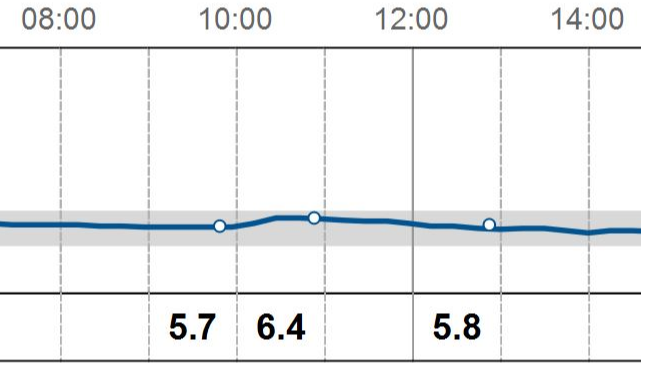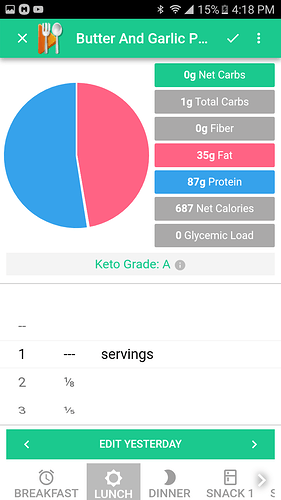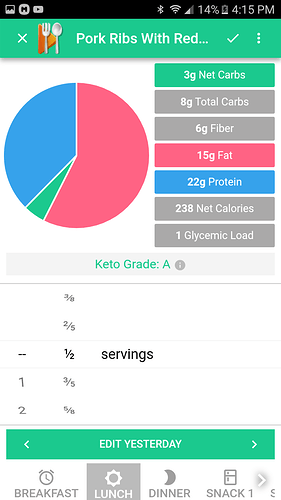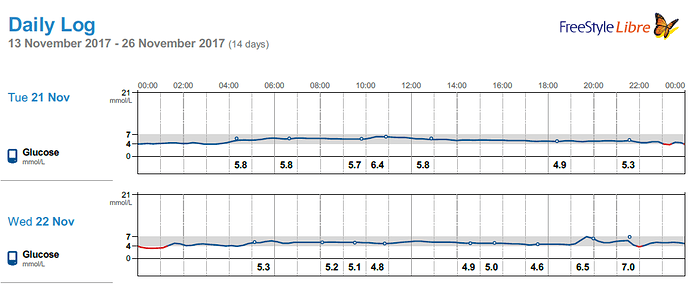It is, no way that’s right. Were those pre-defined foods? I make sure I get in 200-225g daily, eat a lot of meat and even with pre and post workout shakes it’s hard to get into the 200’s.
Do calories matter? For me atleast the answer is yes
It is the morning, typically, but this would be outside of what I’d get from dawn phenomenon. I am not actually stupid.
Btwn lunch and dinner i did eat about 2 lbs of meat. I lean toward carnivore these days
Until we get an insulin meter, this won’t happen. Glucagon should bring blood sugar back up, so that overall blood sugar stays stable. Here’s my calculations for a meal (note: there were a few carbs in this): “Totals: 839 calories, 18.8 g fat (169.2 calories, 20% by cals), 162 g protein (648 cals, 77% calories)”
Here’s the resultant blood sugar:

Basically, zero rise. Here’s that day (Tues, 21 Nov) and the next day (the day before Thanksgiving, note the high carb at night on Wed 22 Nov):
Note that my blood sugar was lower on Wednesday morning, as compared to Tuesday morning. Tuesday was when I ate well over 200 grams of protein (did not capture what I ate for dinner Tuesday night). Multiple by 18 to get US units.
I should also note that the reason my blood sugar went up Tuesday morning is due to exercise. Exercise causes my blood sugar to go up and stay higher for a while (note the 5.7 at about 10am; compare with Wednesday, where I did not exercise).
It’d be great to have an insulin meter. There is one in development, and you could sign up to test it. I looked into it, but it was quite expensive ($1,000 or so?). I think it would be interesting data, but if you eat 2 meals a day or fewer, you kinda know your insulin will be high for those meals. But since you aren’t eating at any other time, then insulin should go low.
If someone does have some kind of delayed response to protein (I don’t), I’m not sure an insulin meter would help there, either.
But it could provide some interesting info. Maybe eating fat with protein helps mitigate the insulin effect? Maybe eating late at night really does cause a higher morning insulin? Maybe some types of proteins are worse for some people?
I love that new technology is always in progress!
I’m in the fortunate position of knowing how much insulin I’m taking and being able to - albeit crudely - identify its relationship with and influence on my blood glucose. I feel that people without T1 (or an insulin meter) really have no reliable way of truly measuring the influence of factors such as food on insulin demand, insulin response and blood glucose, as it’s not possible to quantify - or remove - insulin (and glucagon) from the equation.
No endogenous insulin = nothing to measure. It’s a consistent zero.
Exogenous insulin = measurable.
Blood glucose = measurable.
I have no idea what your level of knowledge is but thinking that something you ate 12 hours before can have a significant impact on your morning blood sugars is an interesting view… the only way to test is to not eating anything but then an extended fast could have its own impact so not sure how you could tell…?
It’s not just protein - there are a couple kind of fibers (not the kind you’d find in vegetables, but kinds typically found in protein bars) that don’t have any effect on my blood sugar immediately and then I get a rise the day after.
As to how I know - well, I basically eat the same stuff most days, and I get similar results in terms of blood sugar (and other stuff) and I do pretty much the same stuff. So if I want to test something, like a new supplement or more exercise or whatever, then I keep everything else the same and adjust that one thing.
Sometimes I test it for a while (usually a month) sometimes less. Sometimes this is when I notice something that seems to be a thing, which is what happened with the protein.
The protein effect was replicable and large enough I’m as certain as I can be that it wasn’t noise.
You may find that it changes over time of course.
As you become less T2 then the impact could well lessen. What kind of noticable rise is it?
Amen to original post! CICO rules me, and I’ve alternatively cut, bulked, cut lately and do gain/lose accordingly.
Impressive cause and effect and thanks for putting it into words and and sharing a similar N1.
That actually is true. Why? Because your gut metabolizes them later.
I think you have to be very careful when you test things. I’ve been convinced of certain things (such as eating late causes higher blood sugar), only to have negative results the longer I’ve tested.
The only two things I believe are still true: fasting multiple days increases my ketones; fasting 1+ days causes a temporary lowering of morning blood sugar, which goes away once I eat, though it might take 1-2 days to come back to normal.
Otherwise, everything I used to believe (higher protein = higher blood sugar; coffee causes an increase in blood sugar; higher protein = lower ketones; etc.) fell apart after testing enough.
Argh yes, YES YES. “it matters for some people and it doesn’t matter for some people” YES why is this so hard to grasp?
what works for one may not for the next, there are no absolutes as so many variables exist.
So silly to argue this point in a generalized kind of way.
I’ll add my personal anecdotal experience, in brief:
when I started keto Aug 2017 I could eat a ton and a ton of fat including lots o’cheese and I lost fast and furiously for two years.
When I got close to goal (had only 10-15lbs to go) I had to drop cheese. Now, even closer to goal have had to drop fat, to break stalls.
Is it CICO in my case? Appears to be. So even for the same person, over time things may shift.
I’m in excellent health, have always been, have no insulin resistance and was only fat for around 3yr of my life so those things factor in.
For someone else it’ll be totally different!
CICO’s importance shall vary so with each individual it’s ridiculous to argue its merit/detriment except as applies to a particular case.
It might not be CICO. Cheese could be because you have an issue with the particular protein in cheese (likely casein, though there’s some evidence about A1/A2 proteins). Dropping fat could mean you’ve upped protein, therefore causing more satiety. It could also be that whatever “fat” you were eating was actually causing you to overeat. Eliminating that therefore caused you to eat less.
This is where CICO fails, because the body is much more complex than a simple furnace or however you want to characterize CICO.
Another example. I listened to a podcast where the interviewee ran a study where they took metabolically healthy people and overfed them by 3,000 calories a day, for several weeks I think. The maximum amount gained over that time? 1kg, or about 2 pounds. The subjects said they felt great and had tons of energy. How does CICO fit into this? Furthermore, why did only one person gain 1kg, while others did not? How can you gauge which person will gain some weight and which will not?
Well, and stuff is a moving target, since the body is an adaptive organism. Some stuff may have been true and now isn’t.
In the case of protein, I’m experimenting next month with a combination of high* protein and fasting, and I have a suspicion that for various reasons the affect on my blood sugar is likely to be different, because I think some stuff has changed.
But to get back to the protein and blood sugar tangent, I was reading a study where they gave type 1 diabetics meals containing either 5 grams of protein or 60, keeping carbs and fats the same, and then saw how much insulin to took to keep their BS at the levels they wanted (5.5 mmol I think - since it wasn’t the US measurement it didn’t stick in my memory).
Type 1’s do always need to cover protein - so yes, it does affect blood sugar, which isn’t new knowledge. In this experiment, on average, they needed about half again as much insulin for 60 grams of protein as they did 5.
What was interesting was the actual numbers. It ranged from one kid (these were teenage boys) needing less insulin for 60 grams to one kid needing nine times as much. Which demonstrates how much individual response can vary (and for various reasons - while the kids were, I believe, fasted before the meal, I wouldn’t rule out previous meals having some relevance here).
TLDR: Stuff is complicated, but interesting,
*Relatively speaking. About a gram per pound of lean body weight. Ish.
You can eat the exact same meal every day for 4 months portioning out each portion with a scale down to the gram. You can do only 15 minutes of exercise a week to ensure that daily caloric expenditure remains constant. You can buy an $11,000 metabolic cart/indirect calorimeter that measures resting metabolic rate (RMR) and respiratory ratio (RER). You can watch RMR and RER on a daily basis so that you can compare energy expenditure vs energy consumption. You can write an pretty simple algorithm that uses the basic CICO formula to predict weight loss based on the energy balance of CI - CO. Then you measure your weight on a very precise scale every single day and compare it to what CICO predicted. Not hard.
I did that. After I was on keto for a while and was fat adapted, CICO was so predictive it was almost laughable. I was completely shocked because I expected the exact opposite. The only exceptions were when I would cheat with carbs and beer once every few months. That would blow up the correlation curve for days and days until my metabolism and hormones recovered. When I got back into ketosis, the CICO predicted line and my actual results were within 2% of each other for weeks at a time.
That’s my n=1. Most folks that have “healed” their metabolisms with keto over the course of six months will probably find exactly what I did. The longer you are on keto, the more calories matter. If you heal your metabolism/hormones, and you carefully track calories in, calories out, and RMR, you’re weight loss results will mirror CICO so closely it will blow your mind.
People with 1 in a 10,000 metabolic curses probably perform differently on that test.





